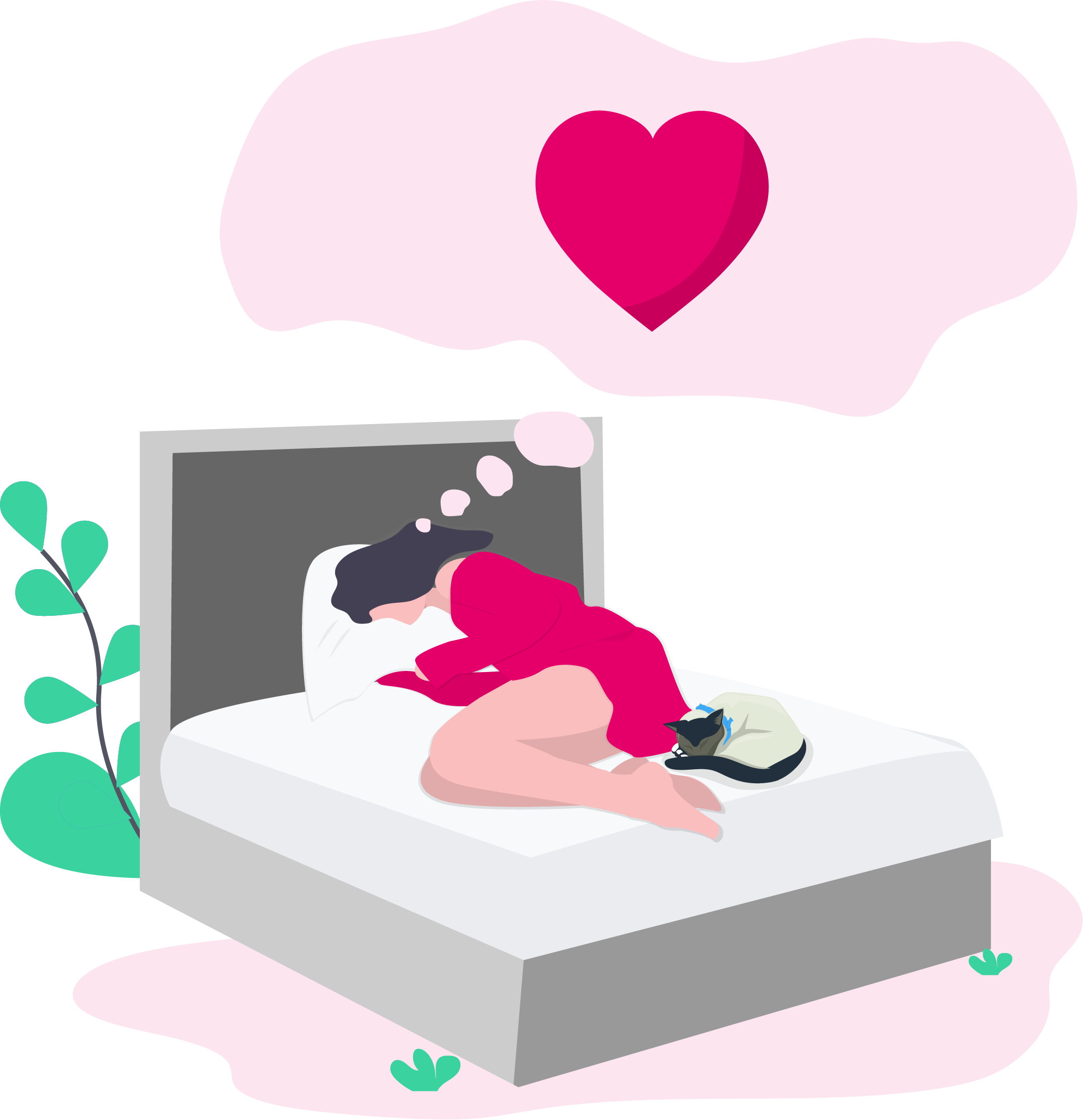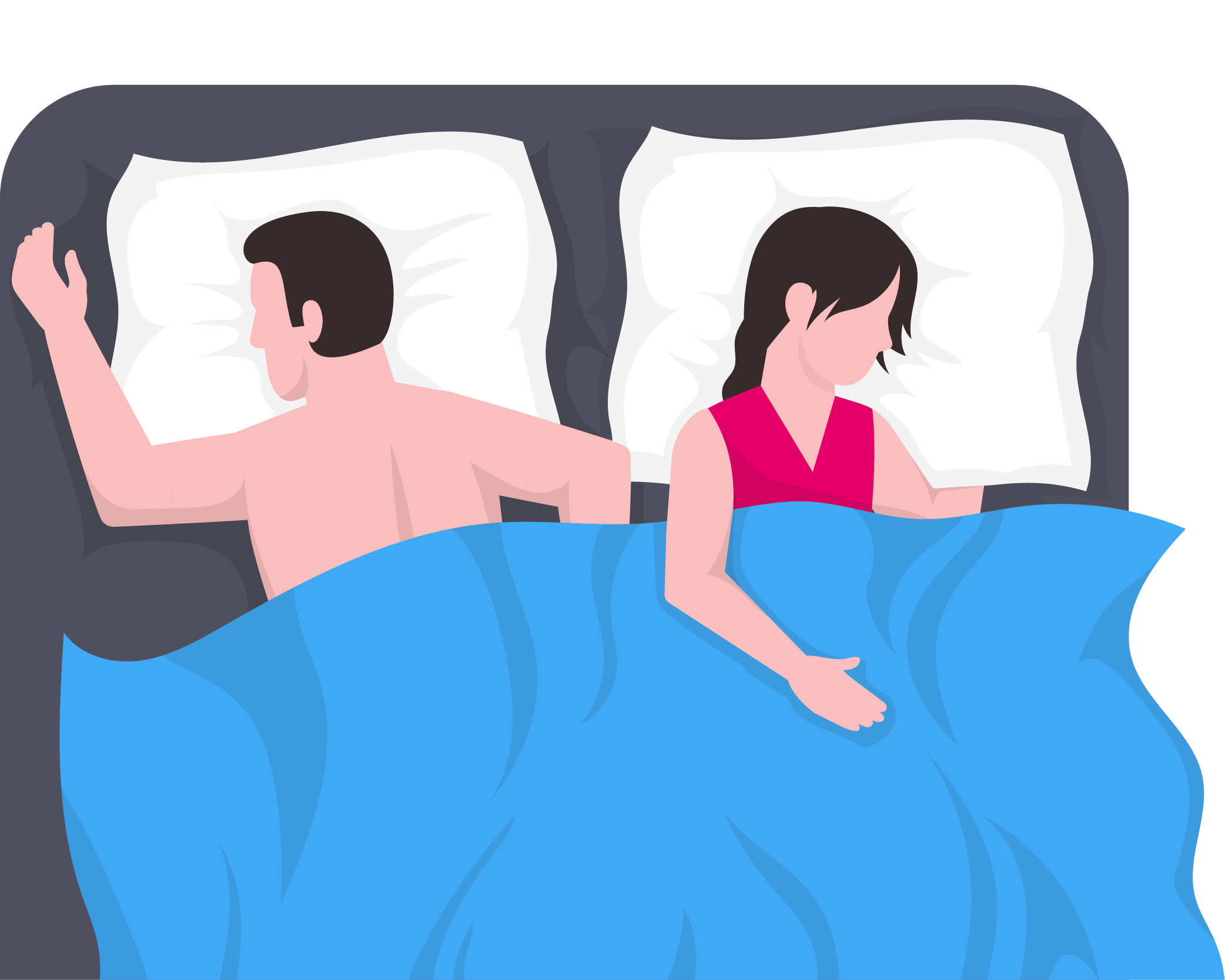We spend nearly a third of our lives sleeping, far more time than just about every other activity short of breathing. In relationships, sharing a bed with a partner can be a source of intimacy with pillow talk, cuddling, and sex being an important part of our lives. While it’s romantic for some, for others it can be a source of frustration, with tossing and turning or different sleep schedules might keep a partner awake, leading to weariness and fatigue the next day.
Here at Nanaya, we use data to help our users live fuller love lives – and what better to investigate than what we spend most of our lives doing? So we asked our users about their sleep habits and the results are in!
In short, our study uncovered:
- About 80% of people share a bed with their partner.
- Couples with a pet cat or dog are about 10% more likely to fall asleep cuddling.
- People who enjoy cannabis are about 8% more likely to fall asleep cuddling.
- Almost no one sleeps apart because of snoring. It’s only a deciding factor for less than 1% of all couples despite almost half of couples dealing with it.
- Sharing the same bed doesn’t make a big difference in how long or well you sleep
- People who are more cautious, passionate, and open-to-experience are more likely to sleep cuddling.
First, we’ll identify the types of people who do and don’t share the same bed. Next, we’ll try to understand the implications of sharing the same bed. But before we continue, you can get your own love life prediction and participate in our studies by trying Nanaya today!
Who Shares the Same Bed?
During June 2019, about 600 users filled out our sleep survey at the end of our personality and future prediction questionnaires. In general, most people tend to share a bed with their partners – about 80%! Of those that share a bed, about 60% fall asleep cuddling.
Age
We say “about” because there’s a different depending on how old you are. The pie charts below show that as you get older, people tend to sleep apart while sharing the same bed with sleeping in different rooms goes down.
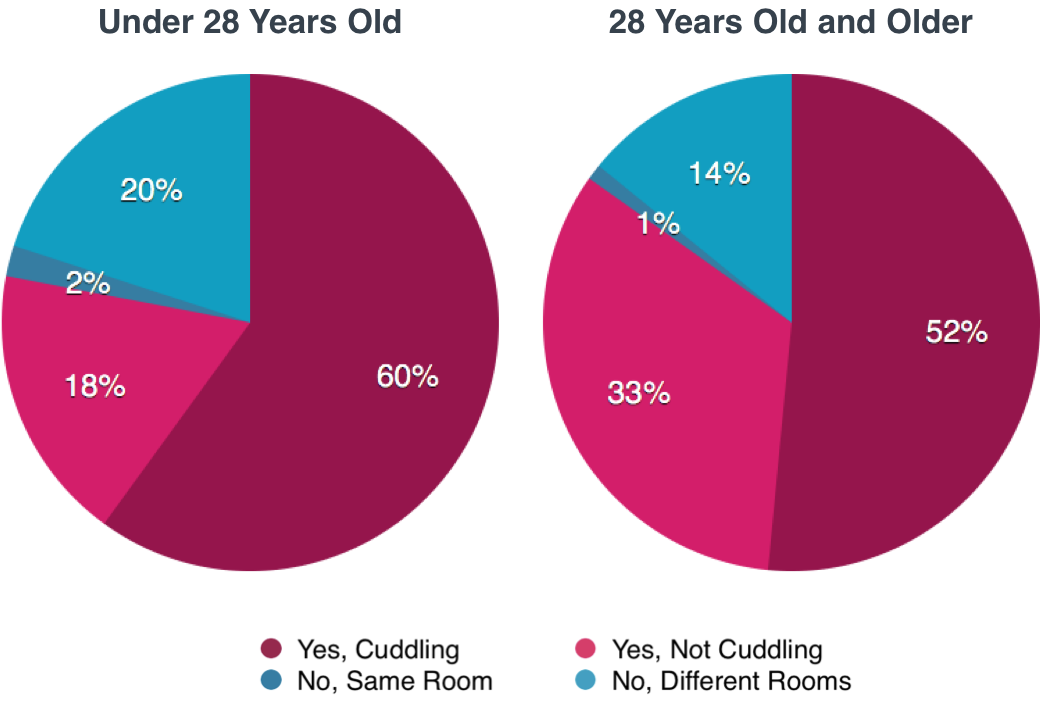
So there are a few takeaways from these two pie charts. First, the older people get the more likely they are to share the same bed. Not a surprise as a big part of why younger couples sleep in different beds is simply that they aren’t living together. At the same time, older couples will fall asleep cuddling less than younger couples.
Pets
Another question that comes to mind is: does having pets changes peoples’ sleep and cuddling habits? Yes! Having a cat or dog makes it 10% more likely that you’ll fall asleep cuddling with your partner.

Seeing as though cuddling is one of the main reasons to get a pet – this doesn’t come as much surprise.
Drugs
In our last study, we showed that drug use was correlated with being single for less time between relationships? Does it also make people more cuddly? Here we evaluated only alcohol and cannabis user to find that cannabis users are more likely to cuddle with their partners while people who drink are similar to the rest of the population.

If this comes as a surprise, cannabis is well known for relaxation, euphoria, and improving sex. It would seem to make sense that people who enjoy cannabis tend to fall asleep cuddling.
Bed Size
Readers who lived in a college dorm in America at some point in their lives have likely had to contend with tiny beds. It’s impossible not to cuddle in a twin size bed when there’s hardly room for two people. Conversely, given the wide open space of a king size bed – do people still want to cuddle? Here, it turns out that having a larger bed only makes it more likely that you’ll cuddle with your partner. The opposite of what we were expecting!
Specifically, about 30% of people who fall asleep cuddling have king size beds as opposed to 20% of people who don’t cuddle while falling asleep.
To be safe, this is based on users over 27 years old as younger people tend to have smaller size beds and would skew results.
Art Museum vs Spectator Sports
Nanaya has an extensive questionnaire where we ask about hobbies and activities. Just for fun, we wanted to investigate how two groups of people compare. Do people who go to the art museum fall asleep cuddling more or people who watch sports?
As it turns out, both groups are nearly identical. Of people who go to the art museum and people who watch sports, about 60% fall asleep cuddling.
Who Doesn’t Share the Same Bed?
So far, we’ve only looked at people who share the same bed. What about people who don’t?
In general, people who don’t share the same bed sleep in different places entirely rather than sleeping in different beds in the same room. Although, it was unavoidable on American TV during its golden age, the legacy of Lucy and Desi doesn’t really carry on to today.
Why Don’t They Share the Same Bed
We asked users who don’t share the same bed why they don’t and offered a few choices: their partner snores, religious or cultural reasons, personal space, it gets too hot, and other.
These numbers reflect the percentage of those who don’t share the same bed. They don’t add to 100% as response wasn’t mandatory for this question and users could select more than one.

After Other, Cultural/Religious reasons are the most likely to place partners in different beds. Notably, people under 27 are twice as likely to choose this than older users. Preserving personal space is only a deciding factor for 10% of people who don’t share the same bed.
Snoring is only a reason for a handful of people despite about 46% of all surveyed users saying either they, their partner, or both snore. So even though it might be annoying, less than 1% of people sleep apart because of snoring. Within that <1%, people older than 27 were over five times more likely to choose snoring as a reason for sleeping apart. While the sample is quite small at that point, it indicates the importance of understanding how age changes behavior. (It’s worth mentioning that our users tend to be younger and people who are older tend to snore more. We report 42% of men snore while 24% of women snore. This is a similar proportion to what’s reported in the literature, “24% of young-middle aged men and 9% of women and in 70% of older men and 56% of older women.”)
Does where you sleep affect how you sleep?
As a part of our study, we asked users how many hours they slept per night and how rested they feel when they wake up, on average. This way, we can determine the impact of sharing a bed with a partner.
How many hours people sleep
No matter where you sleep, it turns out that people sleep about the same amount! People who sleep in different rooms as their partners sleep the most each night, averaging about 6 hours and 50 minutes. They’re followed by partners who sleep cuddling and then those who sleep in the same bed but not cuddling. Those who sleep the least are those who sleep in different beds in the same room, averaging 6 hours and 20 minutes. (So few people responded that they sleep in the same room but different beds that we can’t be too confident in that finding.)
Whichever way, the total difference between the extremes is about 30 minutes.
How rested people feel
We asked users to rate how rested they feel on a scale between 1 and 5, with 5 being the most rested. Given all the commotion in sharing the same bed, like perfidious blanket stealing (really, there’s a product just to keep your partner from stealing sheets!), maybe people who sleep apart would feel more rested?
The data does bear that out, but just barely. People who share the same bed have an average response of 2.76 while people who don’t share the same bed have an average response of 2.95.

Can Personality Predict Where You’ll Sleep?
When you take the Nanaya Personality Quiz, the result is a four-factor personality type describing your energy, confidence, determination, and openness to experience. (You can learn more about them here.) We built our personality quiz based on real data and seeing how outcomes were affected by personality. So if Nanaya personality types can predict love life, can they predict how you sleep with your partner?
Energy
Nanaya’s Energy trait describes how actively people approach the relationships they are in. At one end of the spectrum, people are more expressive, creative, playful, and intensive. We describe these people as Passionate. One the other end of the spectrum, people tend to be more reserved (not necessarily “introverted”), calm, and sober. We describe these people as Tranquil.
As it turns out, people who are more Passionate are about 15% more likely to sleep cuddling compared to people who are more Tranquil! As a whole, 90% of people who are more Passionate will share the same bed as their partner; so being more Passionate is a good predictor of sharing the same bed.

Confidence
Confidence describes how much reassurance and emotional validation people need from their partners to be satisfied in a relationship. At one end of the spectrum, people are more independent, daring, and self-satisfied. We describe these people at Secure. At the other end, people are more cautious, deliberate, and needing of attention. We describe these people as Cautious.
Remarkably, people who are more Cautious are the most likely to share the same bed, but especially to be big cuddlers. In fact, they have the highest rate of cuddlers of any of the groups we evaluated in this study. If cuddling offers more emotional security, then this makes plenty of sense. Otherwise, more Cautious people are only slightly more likely than others to simply share a bed. In this way, the Nanaya Confidence trait is a good predictor of how cuddly people are.

Determination
Nanaya’s Determination trait might seem out of place for a romantic personality quiz, but it makes a lot of sense. People who are more Flexible are more likely to go with the flow, easier going, and are less confrontational. That’s good for avoiding drama but bad for avoiding hard conversations that are sometimes necessary. Being more Rigid means you’re more likely to know what you want out of a relationship, which can offer direction for a relationship…but sometimes too much. But what does it mean when going to bed?
Not too much. No matter your Determination result, you’re equally likely to share the same bed as your partner – but people who are more Flexible are more likely to sleep without cuddling.
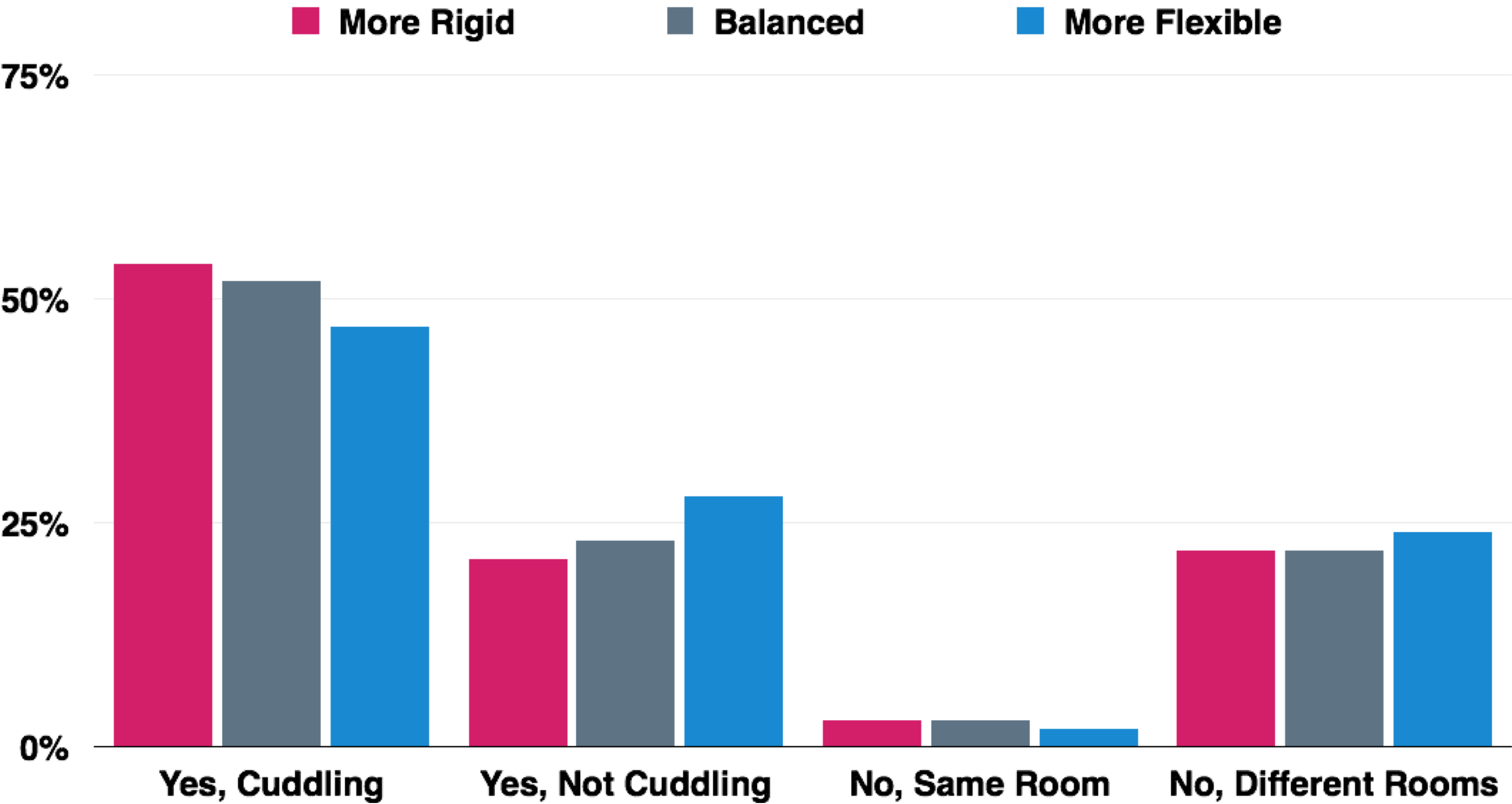
Lifestyle
Lifestyle describes how open people are to new experiences. “New experiences” doesn’t always mean living an adventurous lifestyle. On one end of the spectrum, people are more satisfied living a varied life, always trying new things. We describe these people as Wild. On the other side of the spectrum, people are more content to fall into routines, stay in on weekend nights, and attend to create comforts. We describe these people as Tame. While we didn’t expect Lifestyle to be a predictor of how people sleep with their partners, we were surprised!
Being more Wild means you’re more likely to share a bed and cuddle. Specifically, 85% of people who are more Wild share a bed with their partners, as opposed to 81% and 75% people who are balanced and more Tame, respectively.
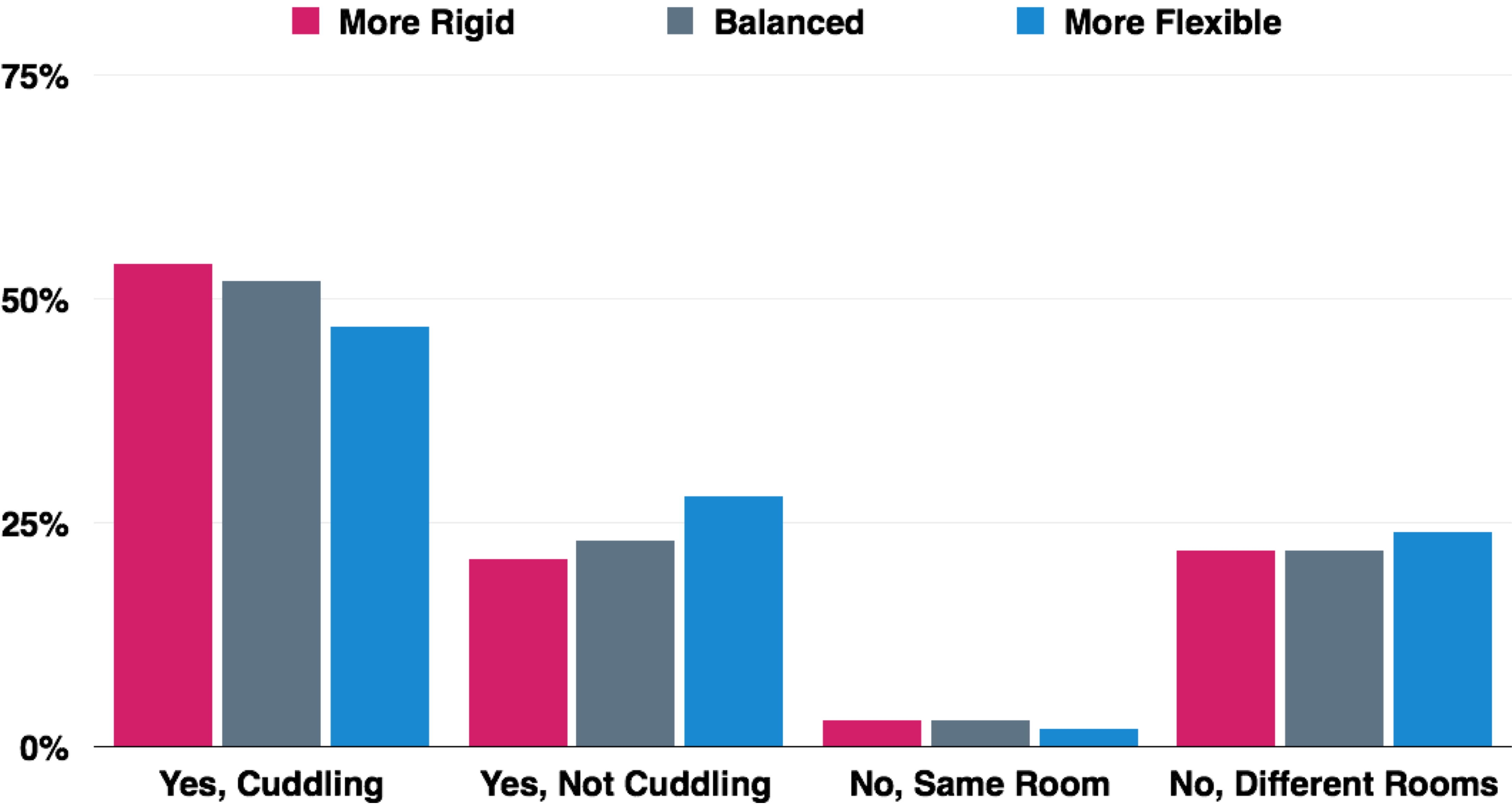
Stay Tuned
Keep checking our blog for the latest Nanaya research! If you like this post, be sure to check our in-depth study of how long people stay single.
Until then, predict your own love life with Nanaya, now on iOS and Android!


